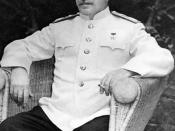Tragedies in history can be considered a dime a dozen. Like many tragedies however, one time period stands out to have an unforgettable tragic ending to the lives of hundreds of thousands of people. During the early to late 1930ÃÂs, the USSR or Soviet Union was dominated by the communist leader, Joseph Stalin. StalinÃÂs reign of the Soviet Union was an unfortunate time for the many civilians of Moscow, the Russian capital, during 1937-38. The time period, notoriously known as ÃÂStalinÃÂs great purge,ÃÂ underwent the practices of mass arrests, tortures, and imprisonment or execution without trial of anyone opposing his regime, on a regular basis. In an excerpt taken from George Kennan, over 681,692 people were shot during 1937ÃÂ38 alone and hundreds of thousands of innocent people were convicted under false pretences, and imprisoned in gulags (labor camps.) The recorded information dedicated to this period of time history, and to StalinÃÂs reign is endless.
For example, the film Burnt by the Sun, by Nikita Mikhalkov, and the novel Sofia Petrovna, by Lydia Chukovskaya both exemplify two real life accounts of the ÃÂgreat purgeÃÂ in fairly different ways. In Burnt by the Sun, and Sofia Petrovna, the two main characterÃÂs Nadia and Sofia Petrovna both embody the theme of blindness to the truth, along with images in both the film and the novel of the young pioneers, the theme song Burnt By the Sun, and the cans of crab for Kolya.
The film Burnt by the Sun released in 1994, by Nikita Mikhalkov is set in the city of Moscow, Russia during StalinÃÂs reign, a year before the ÃÂgreat purge.àNadia, played by Nadezhada Mikhalkova, the daughter of the main character, is an adorable, witty young girl, whose love for her father is captured in every heartfelt scene throughout the film. The theme of blindness is apparent in Nadia particularly because she is only six years old, and her naïve way of thinking is expected of a child her age. An example of her innocent childlike mentality is evident in the scene when Mitya, an old family friend arrives to her home, and disguises himself as an elderly blind man, Nadia asks him, ÃÂare you the summer Santa?àMitya answers, ÃÂYes Nadia! IÃÂm the wizard from the Maghreb.àNadia asks, ÃÂwhatÃÂs the Maghreb?àHe replies, ÃÂMaghreb is the land where the summer SantaÃÂs live!àMityaÃÂs humor makes Nadia, and probably every other six year old, believe that his visit is for nothing other than good. Little does she know however, MityaÃÂs intentions arenÃÂt that of someone who is visiting on good terms, he plans to arrest her father, Kotov, under direct orders from Stalin. NadiaÃÂs innocent blindness to the corrupt policies of Stalin and truth of her country (that she adores so much), is due in part to the ÃÂyoung pioneersàor children who follow the sovereignty of the country and are brainwashed in rejoicing StalinÃÂs supremacy. The ÃÂyoung pioneersàare an example of an image reflecting the theme of blindness in the film. By having children of Moscow honor Stalin as a hero, and not allowing them to see the secret terror he is causing among innocent civilians, shows the corruptness of the country and the ironic blindness of the image. Nadia is astonished by the young pioneerÃÂs loyalty to Stalin and the country of Moscow, and dreams of one day joining them in their celebrations. Her naïve outlook on her country and blind faith in hopes of becoming a ÃÂyoung pioneeràmakes her a blind character throughout the film.
Nadia is seen singing a recurrent verse in the film from the song Burnt by the Sun, which is another image that exposes ironic blindness. The songÃÂs title is the same as the title of the film, which derives from ÃÂa popular 1930ÃÂs song which was originally the Polish tangoÃÂ (Beumers 20.) NadiaÃÂs favorite verse of the song, which she is shown mimicking throughout the film, is ÃÂburnt by the sun, as the crimson sea did run, I heard you say my dove, that there would be no love.ÃÂ To Nadia, the song represents happiness, and its catchy tune makes it easy for a six year old to easily remember and sing over and over. The audience on the other hand, understands the song as foreshadowing something tragic. For example, in the scene where NadiaÃÂs father Kotov is being taken away by the NKVD (secret police) in the black maria, Nadia begins to sing the song while leaving the black maria, and running home. In the eyes of the audience, the song is an ironic symbol of KotovÃÂs demise, however, in NadiaÃÂs eyes the song is representing happiness, while she believes her father is going away to honor Stalin and his country. The song and the title is a central image of ironic blindness in the film, in lieu of the horrible things that took place during the era of Stalin, and the revolution, yet to Nadia the song has a completely different connotation. The ending of the film presents the audience with another example of just how ironic the title of the film is, in dedication ÃÂto all the people who were burnt by the sun of the revolution.ÃÂStalinÃÂs purges didnÃÂt stop with the death of NadiaÃÂs father, or with the casualties of his purges. In the novel Sofia Petrovna, by Lydia Chukovskaya, the main character, Sofia Petrovna, is also an example of the theme of blindness to the truth and a victim of StalinÃÂs terror. Sofia Petrovna is a novel that was written during StalinÃÂs ÃÂgreat purges.ÃÂ Chukovskaya, the author, is a witness to the convictions of innocent people, and corrupt acts of the government under StalinÃÂs regime in 1938. Chukovskaya follows the life of a common woman named Sofia Petrovna who is devoted to her son Kolya, and his success at such a young age makes her a proud mother. While Kolya is away at Komsomol, a youth organization, similar to that of the ÃÂyoung pioneersÃÂ in Burnt by the Sun, Sofia gets news he has been arrested for having ties to terrorism. When Sofia Petrovna hears the news of KolyaÃÂs arrest, like any mother, she immediately denies it, but her denial throughout the novel is what causes her to be portrayed as a blind character. Her first reaction to KolyaÃÂs arrest is an example of the first signs of her blindness, she exclaims, ÃÂbut heÃÂ but heÃÂ they probablyÃÂ have already released himÃÂ have seen heÃÂs the wrong personÃÂ and released himÃÂ ÃÂ(Chukovskaya 45.) Her blindness to the truth only gets worse throughout the novel. She longs for KolyaÃÂs return home every day, and collects cans of crab, and stacks them on his window sill. The cans of crab are a distinct image of blindness, on behalf of Sofia Petrovna. She collects these cans and other provisions in effort to hold onto the false reality of KolyaÃÂs return from prison, and her being able to send the cans to him again after he is reinstated at Komsomol.
Sofia PetrovnaÃÂs blindness to reality and to the truth of KolyaÃÂs arrest causes her downfall. She tells her friends, co-workers and other people she meets throughout the novel,flase stories about Kolya returning home, and begins to believe the lies she tells. She runs into her former co-worker, the accountant from the Leningrad publishing house, and gaily lies through her teeth, ÃÂYou know I have good newsÃÂ my sonÃÂs been released!ÃÂ (Chukovskaya 104.) This is one example of many, in which Sofia insists on believing that her son has been released. She even goes as far as to tell her new co-workers, that she received another letter from Kolya stating he is going on a business trip to Crimea, on a travel voucher, and when he returns he going to get married to a woman named Ludmila, whom Sofia already had a nickname for, ÃÂIÃÂm going to call her MilochkaÃÂ (Chukovskaya 105.) SofiaÃÂs blatant blindness to reality makes the reader assume that she slowly self-destructed by the end of the novel.
Both characters from the film and the novel depict the theme of blindness, but in two different aspects. In the film, NadiaÃÂs blindness to her country is caused by her naïve beliefs, and innocent mindset. The image of ÃÂyoung pioneersàenable the blindness portrayed in Nadia, and the song, Burnt By the Sun, is an example of the dramatic irony of blindness also seen throughout the film. The theme of blindness in NadiaÃÂs case does offer some protection. Her obliviousness protects her from the reality of StalinÃÂs terror, and for a six year old girl not to be exposed to the corrupt acts of her country can be seen as good protection from her innocent blindness. Sofia Petrovna on the other hand, is blind by choice and her denial state of mind allows her to self-destruct as a character. The theme of blindness to the truth is almost exaggerated in the novel, it seems as if Chukovskaya wanted to emphasize the extreme sense of fear this time period instilled in people, and essentially the only way for Sofia to overcome the fear of her son being arrested was for her to make believe that he wasnÃÂt. The image of the canned crab stacked to the ceiling symbolizes blindness in Sofia. Her longing for Kolya to come home causes her to hold onto something that isnÃÂt really there, and this is portrayed in the cans of crab; her efforts to keep buying more and more with hopes of him returning. In SofiaÃÂs case, the theme of blindness was not a protection, but more of a foreshadow toward her demise from the loss of her son.
Works CitedBeumers, Birgit. Burnt By the Sun. New York: I.B. Tauris, 2000. Print.
Burnt By the Sun. Dir. Nikita Mikhalkov. Perf. Nikita Mikhalkov and Oleg Menshikov. SonyPicture Classics, 1994. DVD.
Chukovskaya, Lydia. Sofia Petrovna. New York: The Deserted House, 1967. Print.
Kennan, George F., Russia and the West under Lenin and Stalin, Boston: Little, Brown andCompany, 1961


